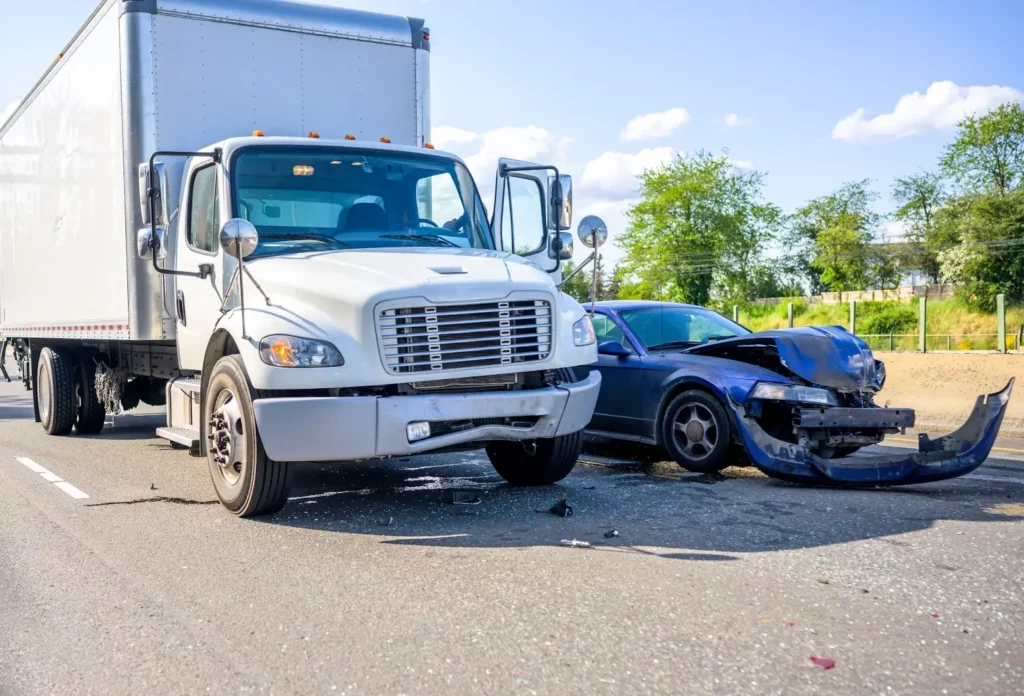The aftermath of a car accident can be overwhelming, leaving you with physical injuries, property damage, and a mountain of questions. One of the most common concerns is: how long does an auto accident settlement take? Unfortunately, there’s no one-size-fits-all answer. This article dives into the auto accident settlement process, explores the factors influencing settlement timelines, and empowers you to make informed decisions.
What is an Auto Accident Settlement?

An auto accident settlement is an agreement between you (the injured party) and the at-fault driver’s insurance company to compensate you for damages sustained in the accident. This compensation typically covers medical bills, lost wages, car repairs, and pain and suffering.
What Are the Steps Involved in an Auto Accident Settlement?

An auto accident settlement can seem daunting, but by understanding the steps involved, you can navigate the process more effectively.
Here’s a breakdown of the typical stages:
- Report the Accident: File a police report as soon as possible after the accident, even if the damage seems minor.
- Seek Medical Attention: Get a medical evaluation to document any injuries and begin necessary treatment.
- Gather Evidence: Take photos of the accident scene, your vehicle damage, and any visible injuries. Collect witness information and exchange insurance details with the other driver(s) involved.
- File a Claim: File a claim with the at-fault driver’s insurance company. You may also need to file a claim with your own insurance company, depending on your policy and state laws.
- Insurance Investigation: The insurance company will investigate the accident to determine fault and assess the damages. Cooperate with their requests for information but avoid admitting fault.
- Consult an Attorney: Consider consulting an experienced auto accident lawyer to understand your rights and options. They can help navigate the complexities of the process and negotiate for a fair settlement.
- Documenting Damages: Gather documentation for all your accident-related expenses, such as medical bills, repair estimates, lost wages, and rental car costs.
- Settlement Offer: The insurance company will likely present an initial settlement offer. This offer is often on the lower side, so be prepared to negotiate.
- Negotiation Phase: Your lawyer (or you) will negotiate with the insurance company to reach a settlement amount that fairly compensates you for all your losses, including medical expenses, pain and suffering, and lost wages.
- Settlement Agreement: Once a settlement amount is agreed upon, a formal settlement agreement will be drafted outlining the terms.
- Release of Liability: In exchange for the settlement payout, you will be required to sign a release of liability, agreeing not to pursue further legal action against the at-fault party.
Remember, this is only a general guideline, and the specific steps may vary depending on the circumstances of your accident and your state’s laws. Consulting with an auto accident lawyer familiar with your state’s laws is highly recommended to ensure you understand your rights and maximize your compensation.
How Long Does an Auto Accident Settlement Take?
The average time to settle a car accident claim varies depending on the complexity of the case. Auto accident settlement timelines can range anywhere from a few months to several years. Straightforward cases with minor injuries and minimal disputes can be resolved in a few months, but intricate accidents with severe injuries, multiple parties involved, or disagreements over fault can take well over a year or even lead to court.
If you’re aiming for a faster average time to settle a car accident claim, having a lawyer on your side can streamline the process by efficiently gathering evidence, negotiating with insurers, and ensuring you receive fair compensation.
Factors That Dictate the Settlement Process

Reaching a settlement after a car accident is rarely a straightforward process. Numerous factors intertwine to influence how the negotiation unfolds and ultimately, how long it takes to reach an agreement. Understanding these factors empowers you to navigate the settlement process more effectively.
Nature of the Dispute
The clarity surrounding the cause of the accident significantly impacts the settlement timeline. A clear-cut case with no arguments about who’s to blame (like a simple rear-end collision) usually settles faster. Meanwhile, any disagreement about who caused the accident can significantly extend negotiations.
Was it a single car accident, or were multiple vehicles involved? Did someone run a red light, or was there a sudden mechanical failure? The more complex the cause of the accident, the more time it may take to sort out fault and reach a settlement.
The severity of your injuries also plays a critical role. Minor injuries with minimal treatment needs are easier to quantify in a settlement than severe injuries with ongoing medical care.
Stakeholders Involved
The number of parties involved in the accident, including drivers and passengers, can complicate negotiations as each has their own perspective and claim. The more people involved in the accident (drivers, passengers), the more complex things get, as everyone has a claim. Different insurance policies for each party can also affect negotiations.
Does one driver have minimum coverage, while another has a policy with more comprehensive benefits? These discrepancies can influence the negotiation strategies of each insurance company.
Legal and Regulatory Framework
Every state has its own laws regarding car accidents. These laws determine how fault is decided, what damages you can be compensated for (lost wages, pain, and suffering), and the deadlines for filing a lawsuit. Knowing your state’s laws is important.
Financial Considerations
The financial considerations involved in your case directly impact the settlement value. The more comprehensive your medical records are, detailing the treatment you received for your injuries, the stronger your case for compensation.
Lost income due to the accident also becomes part of the settlement offer. Did you miss work because of your injuries? Were you unable to perform certain tasks at your job? Providing documentation for lost wages strengthens your claim. The cost to repair or replace the damaged vehicle is another key factor. The insurance company will consider the cost of repairs or the fair market value of your car before the accident to determine a settlement offer.
Time Constraints
Both you and the insurance company might have time constraints that influence the negotiation pace. For example, you may need a quick resolution due to financial hardship, while the insurance company might be approaching the end of a fiscal quarter and want to settle outstanding claims.
Risk Assessment
Each party assesses the risks and potential costs of litigation compared to settlement. Factors like the likelihood of winning or losing a lawsuit in court and the potential cost of legal fees all influence risk assessment.
Emotional Dynamics
The emotional toll of the accident can affect both sides, potentially impacting negotiation strategies. Feelings of anger, frustration, or anxiety can cloud judgment and make reaching an agreement more difficult.
Interest-Based Negotiation
Focusing on underlying interests rather than positions can lead to more efficient and amicable settlements. For instance, your underlying interest might be to recover enough money to cover medical bills and lost wages, while the insurance company’s interest might be to resolve the claim quickly and efficiently. By identifying these underlying interests, both parties can work towards a solution that meets their needs.
External Influences
External factors like media attention surrounding a high-profile accident or upcoming regulatory changes within the insurance industry can influence settlement negotiations.
Cultural and Social Factors
Cultural and social factors can play a role in communication styles and expectations during negotiations. For example, in some cultures, a more direct approach might be preferred, while others might favor a more indirect communication style.
Auto Accident Settlement Timeline
The timeframe for an auto accident settlement varies greatly depending on the factors discussed previously.
However, while there’s no guaranteed timeframe, a general guideline suggests:
- Simple Cases (Minor Injuries): Weeks to a few months.
- Moderate Injuries: 6 to 18 months.
- Severe Injuries: Over 18 months, potentially requiring litigation.
In an ideal scenario with a clear-cut case, minor injuries, and cooperative parties involved, a settlement could be reached within weeks or a few months. This would involve a straightforward exchange of information, minimal back-and-forth negotiations, and a swift processing of your claim by the insurance company.
On the other hand, complex cases with disputed fault, severe injuries, or multiple parties involved can take significantly longer to settle. This timeline could stretch to well over a year or even lead to litigation. Extensive evidence gathering, negotiations with lawyers involved, and the potential involvement of medical experts can all significantly extend the process. It’s always best to consult with an attorney to get a more accurate estimate for your specific situation.
Complications that Can Affect When Your Case Settles
Sometimes, the road to an auto accident settlement isn’t always smooth sailing. Several complications can arise, extending the process and potentially impacting the outcome.
Here are some common roadblocks:
Disputed Fault
This is a major hurdle. If there’s disagreement about who caused the accident, reaching a settlement becomes more challenging. Witness statements, police reports, and accident reconstruction experts might be needed to establish fault.
Severity of Injuries
Serious injuries requiring ongoing medical care introduce complexities. Future medical costs become a point of contention, and negotiations might involve medical experts to determine the long-term impact.
Multiple Parties Involved
Accidents with multiple drivers, passengers, or vehicles can get complicated quickly. Each party has a claim, and sorting through varying degrees of injury and property damage adds time to the settlement process.
Uncooperative Insurance Companies
Some insurance companies might delay tactics, hoping you’ll accept a lower offer due to financial strain. Having a lawyer who is experienced in dealing with insurance companies can be beneficial.
Unrealistic Expectations
It’s important to have realistic expectations about the settlement value. Consulting with an attorney can help you understand the fair value of your claim.
Determining Compensation for Your Injuries from the Car Accident
Car injury settlements can vary significantly depending on the severity of your injuries and the specifics of your case. However, the auto accident settlement process generally aims to compensate you for the losses you’ve incurred due to the accident.
This compensation can be broken down into two main categories:
Economic Damages
These are the concrete financial losses you’ve suffered as a direct result of the accident. This can include medical bills (past and future), lost wages, car repair or replacement costs, and any other out-of-pocket expenses related to the accident. Having clear and detailed documentation for these expenses strengthens your claim and helps ensure you receive fair compensation.
Non-Economic Damages
These are more subjective damages that address the pain and suffering, emotional distress, and loss of enjoyment of life caused by the accident. While harder to quantify, non-economic damages can also be a significant part of a settlement. The severity and duration of your injuries, any long-term limitations they may cause, and the overall impact on your daily life are all factors considered when determining non-economic damages.
When to Negotiate and When to File a Lawsuit
Negotiating a car accident settlement is often the preferred course of action. It can be faster, less expensive, and less emotionally draining than going to court. However, there are situations where filing a lawsuit might be necessary.
Here’s a general guideline:
Negotiate
If you have a clear-cut case, minor injuries, and a reasonable settlement offer from the insurance company, negotiation is likely the best option.
Consider a Lawsuit
If a fault is disputed, your injuries are severe and require ongoing medical care, the insurance company offers a lowball settlement, or you can’t reach an agreement through negotiation, then consulting with a personal injury lawyer to explore the possibility of a car accident lawsuit settlement might be the best course of action.
How Long Do You Have to File a Car Accident Lawsuit?
Statutes of limitations dictate the timeframe within which you can file a lawsuit. These deadlines vary by state, so it’s crucial to understand the specific regulations in your jurisdiction. Missing this deadline can permanently bar you from seeking compensation through the court system. Consulting an attorney at Lakhani & McGrath PLLC in Houston, Texas, can ensure you meet all legal deadlines and maximize your chances of a successful outcome.
Frequently Asked Questions
Car accident settlements can feel complex, leaving you with lingering questions. Here, we answer some of the most frequently asked questions to empower you throughout the process:
How much are most car accident settlements?
While many people search for information on “what is the average settlement for a car accident,” it’s important to understand that There’s no one-size-fits-all answer to this question. Car injury settlements vary significantly depending on the severity of your injuries, the specifics of your case, and factors like fault and negotiation strategies.
However, understanding the different components of compensation (economic and non-economic damages) covered in a settlement can help you approach the process with a clearer picture.
Why do insurance companies take so long to pay out?
There are several reasons why insurance companies might take time to settle a claim. In some cases, they might be conducting a thorough investigation to determine fault or assess the extent of your injuries. They might also be negotiating with other insurance companies involved or waiting for additional medical records.
While delays can be frustrating, it’s important to remember that insurance companies are obligated to act in good faith. If you feel an unreasonable delay is happening, consulting with an attorney can help ensure your claim is being handled appropriately.
Can you sue your insurance company for taking too long to pay a claim?
In certain situations, you might be able to sue your insurance company for bad faith denial or delay of a claim. However, this depends on the specific circumstances of your case and the laws of your state. Consulting with an attorney experienced in car accident settlements can help you determine if you have grounds for such a lawsuit.
Your Next Steps Towards Recovery
The aftermath of a car accident can be overwhelming. That’s why consulting with experienced Houston personal injury attorneys at Lakhani & McGrath PLLC in Houston, Texas can help you wade through the process easily. They can guide you through every step, ensure your rights are protected, and work tirelessly to obtain the compensation you deserve. Contact Lakhani & McGrath PLLC today for a free consultation and let them help you get back on your feet.



